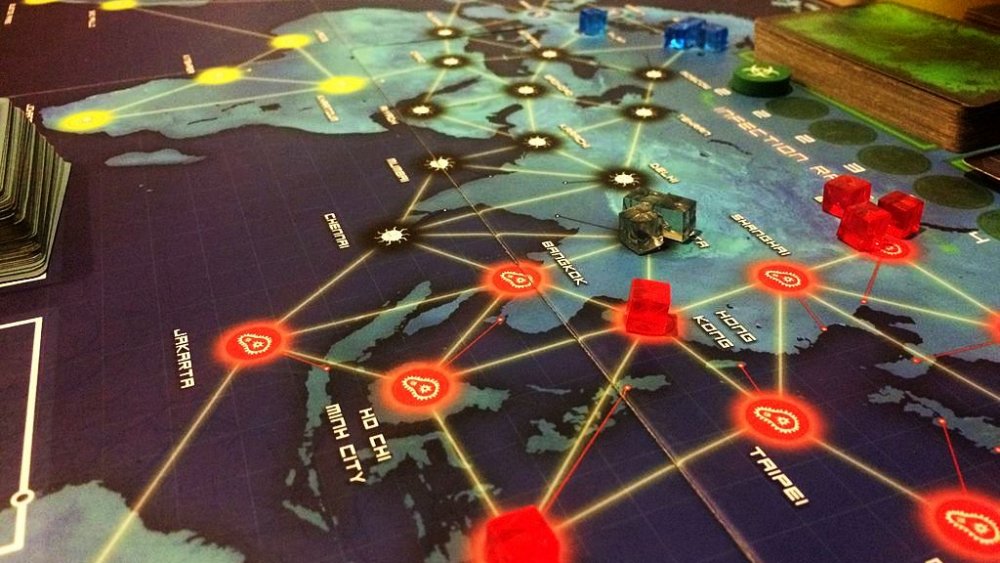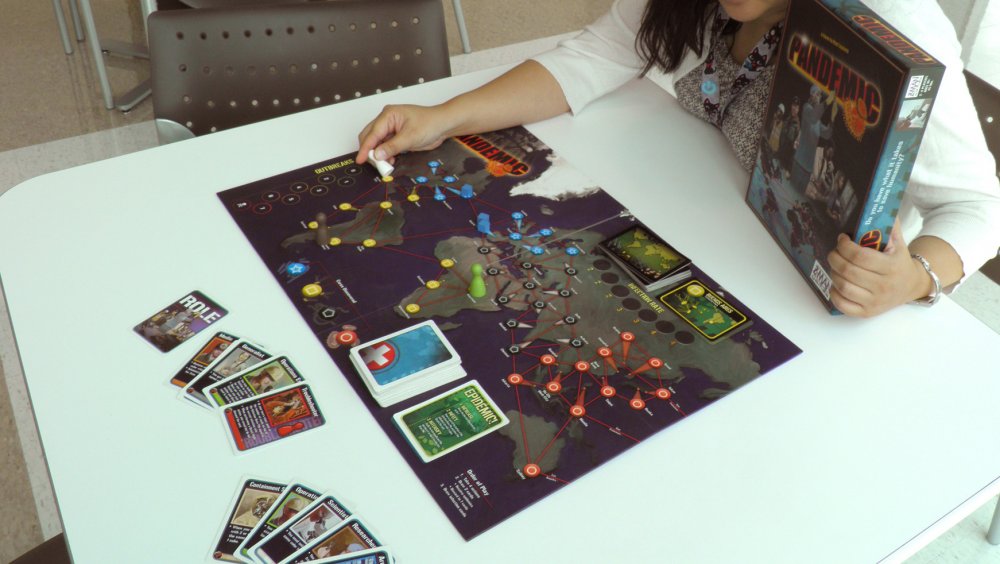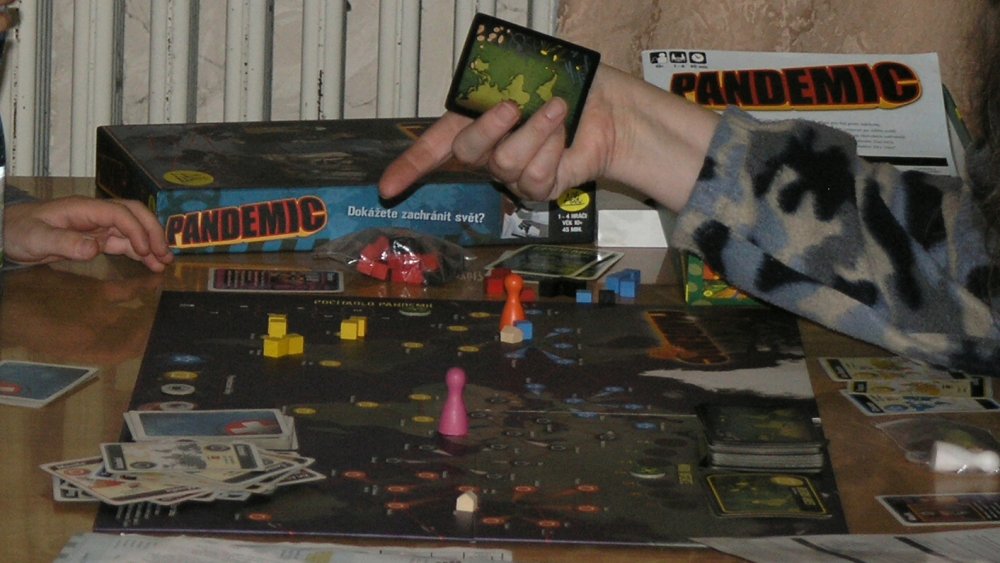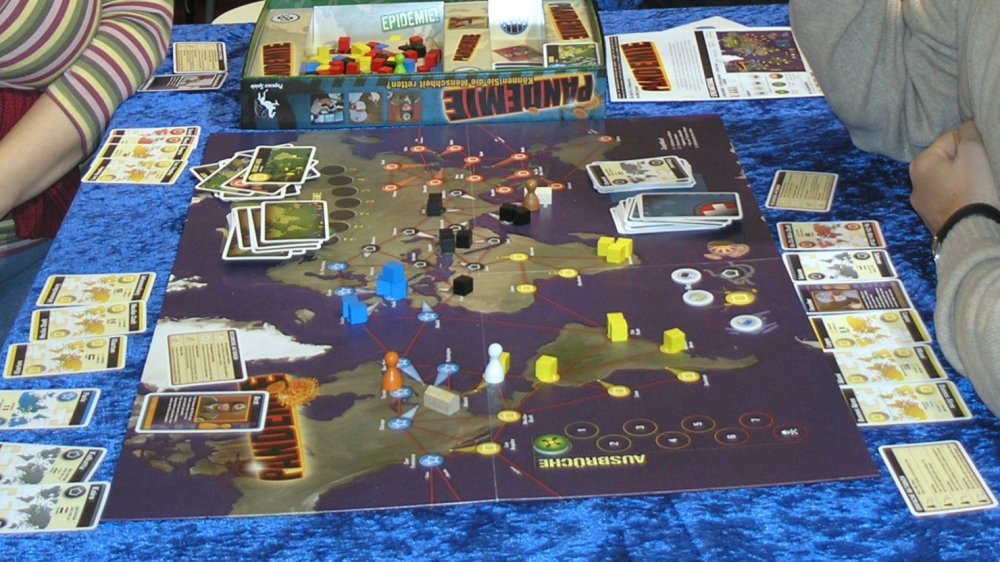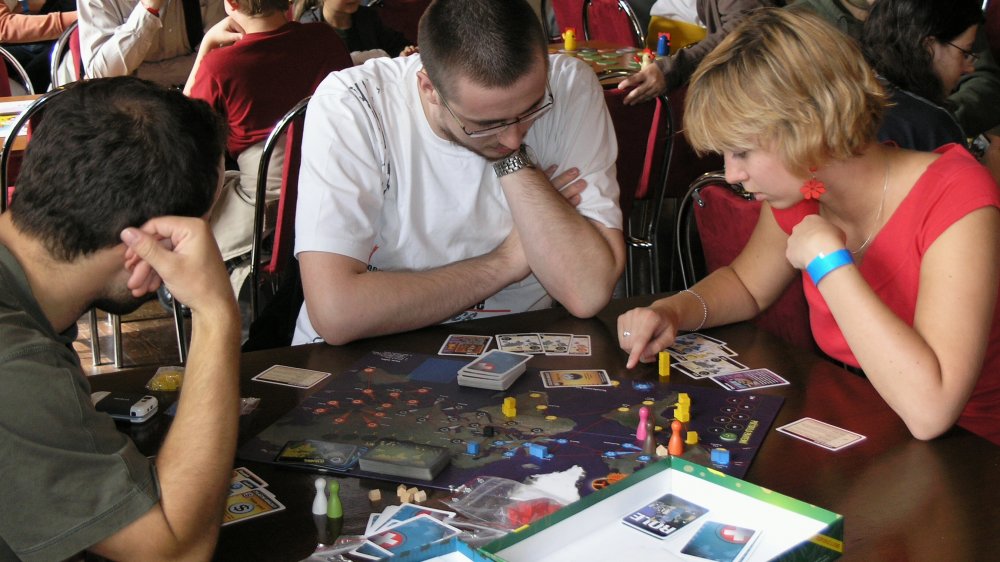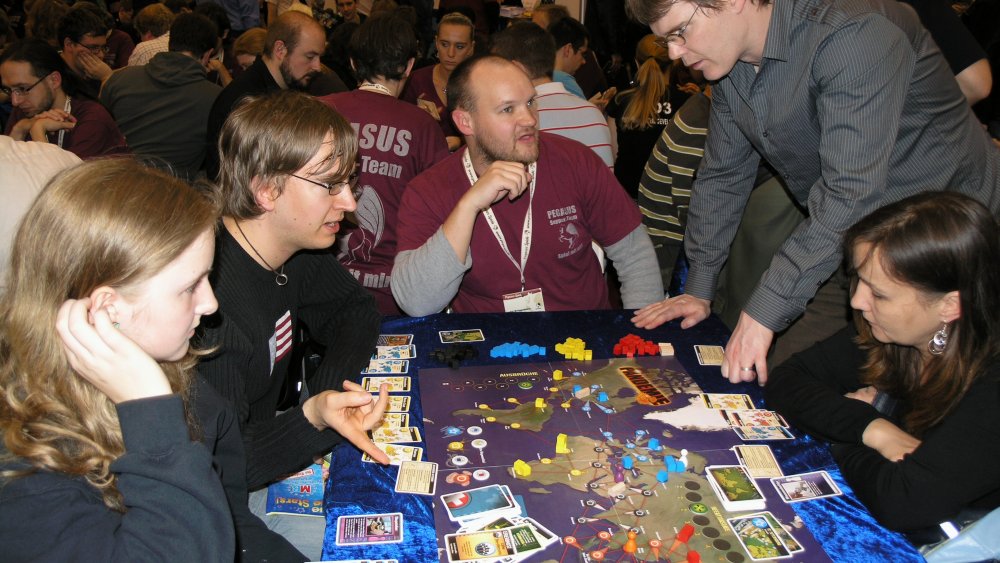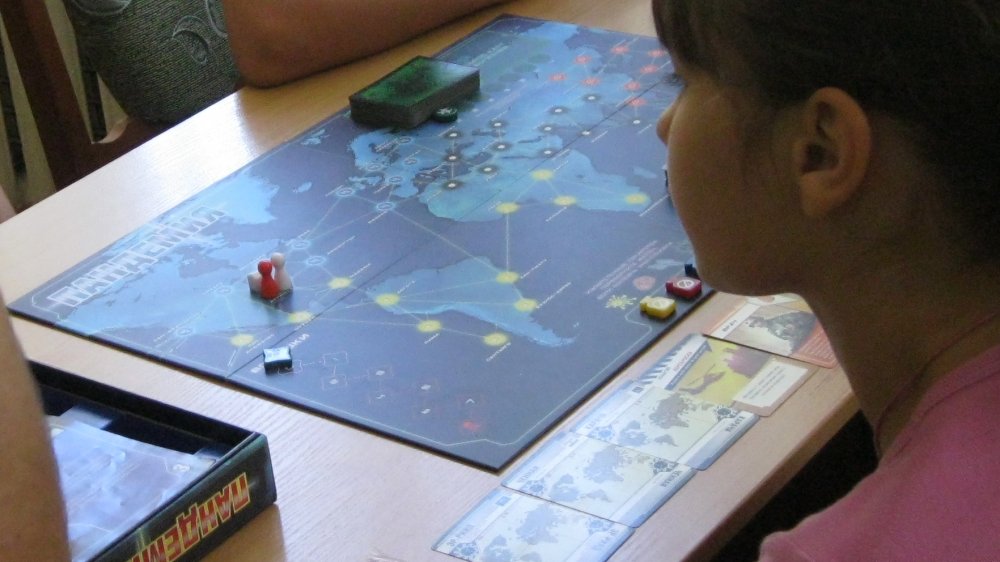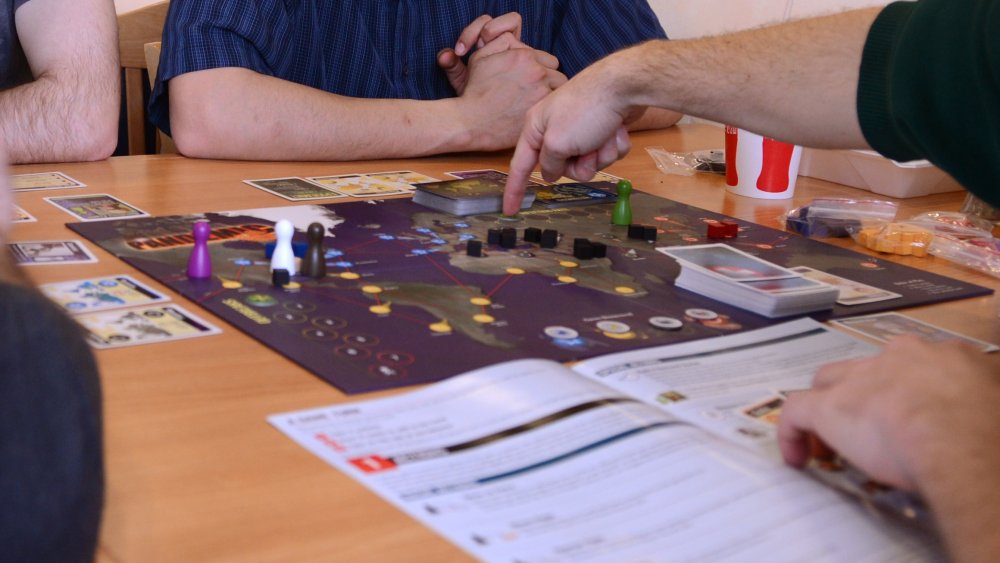The Untold Truth Of The Pandemic Board Game
Pandemic is one of the best-selling board games of all time. In March 2020, this tension-filled board game about disease outbreaks took the bronze on the Amazon sales chart behind two of the all-time board game greats: Monopoly (bleugh) and Clue (huzzah!). But it was hardly a flash in the coronavirus pan: Pandemic has sold more than two million copies since 2008, placing it a few laps behind Twilight and the King James Bible, but light years ahead of any other contemporary board game.
OK, it's not nearly as hellish as climbing an endless vista of treacherous ladders to evade a horde of foul and venomous serpents, but a board game about global pandemic outbreak might come across as a slightly morbid way to spend a lazy Sunday afternoon! So let's stare down the spectacularly diseased elephant in the room, and ask the pointy questions. Who made this peculiar game? Why is it so popular? And what untold truths can a strange board game reveal about how pandemics spread in the real world?
Warning: This article includes spoilers for the Pandemic board game ... and maybe real life.
The Pandemic board game 101
We've established this is a ridiculously popular game about diseases, but let's delve deeper. While the game is now available in a variety of flavors, the vanilla concept goes something like this: You and your gaming buddies are a crack squad of disease-busting, stethoscope-slinging geniuses. Drawing from unique skill-sets, your mission is to work together to rid the planet of a freak show of horrific plagues strutting about as though they own the place. The Legacy version of the game takes the story to a new level. Plot twists and unexpected challenges morph the shape of the game again and again.
This is where it gets kind of odd, though. Although the game lays no claim to depicting how an actual pandemic goes down, there's something very real about the cooperative energy behind it. So much so that, as described in this Q and A session in the Chicago Tribune, Pandemic is used in classrooms and medical schools to illustrate some of the basic strengths and shortcomings of the human condition. Something about the game feels real, from the sterile scientific names attributed to its evil diseases, to the visual of the world's major cities tumbling into a pathogen-storm of chaos, to the gradual mental deterioration of its primary characters under a relentless death-sniffle onslaught. Pandemic builds intensity like few other board games can.
The mind behind the Pandemic board game madness
Given Pandemic's apocalyptic vibe, you could be forgiven for imagining its designer as a diabolical malcontent who, as a child, ate the cream filling out of Oreos before sneaking them back into the wrapper. The truth about Matt Leacock is equal parts depressing and refreshing. Matt is an objectively nice dude. According to his blog, in 2015, at the height of the game's viral popularity, Matt ran "Pandemic Parties" to raise money for the fight against Ebola in West Africa. And this, it seems, is only the tip of the nice-guy iceberg. Another clue hinting at his wholesome leanings come from the distinctly diverse cast of characters baked into his game.
In a world where most of our heroes seem to occupy a relatively narrow demographic band (muscles, attractiveness, highly ... umm ... light skinned), Pandemic offers up heroes from all ages, ethnicities, and walks of life. In an interview for a Geeks Under Grace, Matt said, "I'm committed to bringing more diversity to board games. It's no accident that Pandemic features a triumphant female scientist on the cover. It's important to me that people playing games can find themselves in the games they play and work to ensure that the games all have a diverse cast."
It's all very puzzling then. From the mind of a wholesome and inclusive humanitarian hath sprung a story of plague, desperation, and apocalypse. What gives?
The Pandemic board game's flagrant unfairness prickles
The power of Pandemic, and especially in the more story-driven Legacy version of the game, lies in creator Matt Leacock's willingness to repeatedly break a cardinal rule of board game design etiquette: Pandemic is unfair. And not just a little bit unfair, like a devious yet ultimately trustworthy dad who steals pineapple from his kid's extra-chunky slice of Hawaiian pizza. No. We're talking evil supervillain level unfairness here. Time and again, a twist of board gaming fate will pee (figuratively speaking, of course) in your kettle. The thing is, the harsh twists and turns of Pandemic aren't just Leacock being a great big meanie. Leacock is making a game where art closely imitates life.
Here's an example. Early in the Pandemic Legacy game, you gain access to an awesomely powerful military character. He's precisely the square-jawed, camouflage-trousered chap you want in your corner when the animal byproduct hits the propeller-driven air-circulating cooling device. Until that is, he betrays you, and the game politely instructs you to rip up his card. It hurts. It's infuriating. And It's glorious.
Writing about the betrayal, one incensed player confessed: "(It) was the most visceral moment I've ever had in a board game. I went and wrote rude things about him on the bathroom tiles ... and muttered ... under my breath for a week."
Uncomfortable truths bubble
Pandemic also leads players to what can best be described as one profoundly uncomfortable truth. Ultimately, when you're faced with life or death situations (or in the case of this board game, the simulation thereof), humans are your biggest asset and your biggest liability. Ahem. Ring any bells? It's counter-intuitive, but Pandemic isn't actually a game about a rampant affliction. Sure, a melt-your-face-off post-apocalyptic plague sets the backdrop, but the game is not really about disease. It's about how humans react to something frightening and beyond their capacity to readily control. It's about hard decisions under duress.
One pivotal moment in the game triggers an instruction to open a mysterious box. Inside, players find a small army of scarily fluorescent green characters. Humans. Or more accurately, diseased, dangerous, and desperate humans. From that moment on, the game is no longer about abstract viruses with long, scientific-sounding acronyms. It's about people. Your enemies are innocents. A reviewer for Foreign Policy said, "It's meant to be an entertaining board game. Yet simple games or books can sometimes capture the essence of a complex topic better than more sophisticated treatments. Pandemic puts its sterile-gloved fingers on the heart of the problem."
The art of sensible panic in the Pandemic board game
It's here that Pandemic, the board game evokes some eerie parallels with a real pandemic, AKA, the very real situation everyone is dealing with in 2020 whether they like it or not. A big part of the game is about managing a growing sense of simulated-panic. With your fellow intrepid plague-busters, you somehow have to figure out how to respond to a rapidly escalating situation without — to use a technical term — losing your potatoes. Losing control is inevitable. At some point in every game, players will experience that sinking sensation of a pandemic outbreak cascading out of control. There is no moment of complete containment, and this fraught tension lasts right through to the final moment of victory (or, of course, abject failure).
The way you win this game is very similar to how we "win" against COVID-19. We "flatten the curve" — and if that phrase isn't on a t-shirt yet, it should be! A recent Washington Post article offered readers a fascinating set of simulations for how social distancing can slow the spread of contagious disease, and it's almost horrifying how closely Pandemic the board game illustrates this same principle in slow, fully interactive motion. Of course, it's just a simulation, but it's hard not to feel a tightening in your chest as you watch your cities fall. Pandemic challenges players to panic sensibly. This is probably an excellent skill-set to have these days.
The Pandemic board game is no world for solitary heroics
Another intriguing echo of our current COVID-19 dilemma is that Lone Ranger-type heroes don't fare well when things get plaguey. Pandemic teaches players that you should be wary of anyone who single-handedly wants to save the world. Players need to dig dialog and revel in the iterative art of compromise. Winning requires a willingness to pass tasks between players in a way that is sensible, measured, even (gasp) generous. Characters develop scars and traits that you have to work with rather than against. The heroes of this game are the administrators and supporters. Colonel Flashy Pants Von Go-it-alone in the hazmat suit is just going to get you killed.
In abandoning the same old weary superhero tropes, Pandemic may be one of the few pop culture experiences that actively encourages leaving one's ego at the door. While we (fortunately) don't have too much hard data on how best to survive a real apocalypse, early human experts interviewed in Live Science's "After a Zombie Apocalypse, Here Are 9 Keys to Rebuilding a Civilization," reinforce the game's narrative direction. They emphasize power in numbers and shared goals as pivotal to human survival in tough situations.
And yet... the Pandemic board game is oddly upbeat
Swizzle together the squirming discomfort of recognizing some of our species' worst fallibilities, the virtues of panicking calmly and the dangers of arrogance, and what are we left with? Oddly, civilization-busting sniffles aside, Pandemic is a strangely upbeat experience. It's a game of relentlessly tested cooperation, where your most significant asset is one another, and your darkest threat is a shared failure to collectively adapt. This is a very deliberate design feature. Speaking about cooperation in an interview for Chicago Tribune, Matt Leacock said, "I think the best thing about cooperative play is it promises a safe space where you can experiment without (those qualities) affecting actual life."
Intriguing! So Matt's vision was a cooperative simulation almost? We'll circle back to that, but let's linger for a moment on cooperation and optimism. We're seeing examples of both with the real pandemic we're enduring. In the World Economic Forum website, Douglas Broom reports of kids offering an impromptu concert for a neighbor in self-isolation. In Wales, local councils are recruiting volunteers to go grocery shopping for the elderly and infirm. Kindness rocks. It's hard to imagine any upsides to COVID-19, but maybe if there's anything, this is it. You win together or lose together, or as Matt Leacock put it in an interview on YouTube, "Each player shines in their own way."
What do our monsters reveal about us?
We choose our monsters for a reason. According to Scientific American, our recent obsession with zombies is thought to represent anything from our repressed fears about globalism to a more generalized terror of the masses, and what our species is capable of as an unthinking, unfeeling tribe. Back in the eighties and nineties, we loved our vampires. (Spike? Anyone?) One curiously fanged theory is that humanity's vampire obsession was an artifact of AIDS panic and a shared general unease about blood. Delve further still into our story-telling past and rampaging Godzilla is thought to be a metaphor for Hiroshima and a growing realization of the destructive power of atomic energy.
Which begs an odd kind of question. Given the violent re-emergence of global pandemics into our collective imagination, what will our future monsters look like? Will a new pustule-ridden plague-beast emerge from the fog and slither into our shared nightmares? And if so, what stories and games will we invent to face down that monster, learn something about ourselves, and seize the day? Perhaps this oddly morbid yet optimistic board game will be the first of many such thought experiments.
What do our games do for us?
With some problematic realities on our doorstep, do games like this actually "help?" To be clear, no-one said these games actually should help. They're games. Expecting a game to achieve a higher good is as unreasonable as expecting generosity of cats or fiber from grape-flavored bubble gum.
But Pandemic is, to some extent at least, a simulation. In the nay column, there's the argument that board games like this push us into dwelling on negativity. As Jorge Albor states in Pop Matters, "If you weren't already paranoid about the latest threat to your health ... then Pandemic: Legacy will move you one step closer to hypochondria." In the yay column, the field of psychology is continually uncovering new information on how simulations can prepare us for stressful situations, from dealing with loss to making snap decisions on the battle-field. Perhaps it's a stretch (OK, OK, it's definitely a stretch), but when push comes to shove, one argument is that games like this might be building a behavioral muscle memory that just might serve us in good stead. Sure, it's grossly simplified, but Pandemic pushes players to ask questions, most notably among them, "What would I actually do?"
Whichever column you side with, it looks like we'll be talking about our species' relationship with pathogens for a long time to come.
